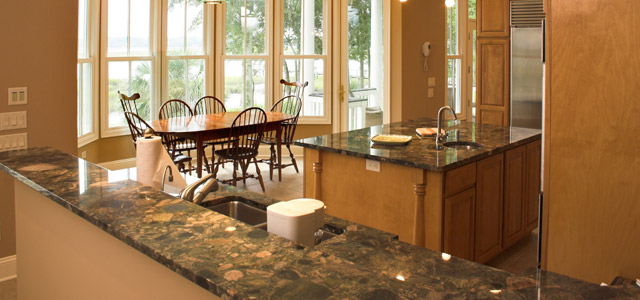You love granite, and you know that it is an attractive option for homes all over. However, you may not know the ins and outs of granite countertops, what they have to offer and why they are a smart investment. Learn some of the most common questions about granite countertops that you likely wanted to know yourself, but never bothered to ask, here.
What Exactly is Granite?
Granite is a type of natural stone that is composed of several large mineral grains that have been packed together tightly. The primary components include quartz and feldspar, along with other minerals, such as muscovite and biotite.
Quartz and feldspar are major components of granite, and they are harder than steel. This is why granite has been such a popular building material for years. Alternatively, muscovite and biotite are mica minerals, which are not as prevalent in granite, but that provide the glittery appearance.
Why is Granite Such a Popular Option?
Granite is now considered one of the most popular options for kitchen and bathroom countertops due to its natural beauty and its durability. Some of the specific benefits of granite include:
- Elegance that adds value to a home
- Stain, scratch and heat resistant
- Ability to outlast the life of the home it was installed in
- Little maintenance is necessary
Can Heat or Knives Damage or Scratch Granite?
Granite can withstand extremely high temperatures. If you place a hot pan or kettle on the surface, it will not damage the stability or color of the surface. However, it is advisable to use trivets for other reasons.
Also, knives will not scratch pure granite. The only substance that is harder than granite is a diamond. For example, diamonds that are scored as 10 on the Mohs scale of hardness is equivalent to granite scored at seven. A diamond blade is the only thing that can cut cleanly through granite.
What are the Specifications for Granite that is Used for Countertops?
Generally speaking, granite countertops use a 1 ¼” thick granite for countertops in the kitchen (however, this can vary from one provider to another). The 1 ¼” thickness is sturdy enough to be placed on the cabinets and withstand any other issues.
There are many surfaces offered when you choose granite, as well, which include:
- Brushed: This is a rough texture that is ideal for outside kitchens; however, there are some homeowners and designers who like the look for indoors, as well.
- Honed: This is a matte finish.
- Polished: This is a glossy, shiny surface and the most popular option purchased today.
What are the Pits that are Present in Granite?
It is not uncommon to see small pits on the surface of a granite slab. These are formed when the granite is being polished. The pits result from some of the weaker parts of granite, such as Biotite, flaking off of the surface.
These pits do not cause the granite to be any less durable or inferior in any way for use as countertops. However, the pits may be a bother to some people. It is a good idea to discuss these with the fabricators or installers to see if there are options that do not have pits if you do not care for how they look.
It is not recommended to have the pits filled in because there is no compound that can permanently or adequately fill up the spaces without affecting the surface of the stone visually. The very best option is to discuss and see these imperfections before purchase to make sure you can live with them. If not, choose a different slab.
How Often does Granite Need to be Cleaned or Maintained?
Granite is a durable option or countertops; however, it will have to be cleaned regularly to continue looking great. Any time a spill occurs, or if there is a buildup of gunk or grime, then wiping it away or cleaning with a non-abrasive product will help ensure the granite continues to look great. While most granite will not absorb spills or other items, it still needs to be cleaned and wiped down like any other countertop product.
There is no question that granite is a popular option for homes because of its great looks and superior durability. Taking the time to learn more about granite can help you determine whether or not granite is the right option for your home or space. If you are ready to learn more about granite or have made the decision that it is right for your home, be sure to contact a granite professional to begin the selection and installation process.


